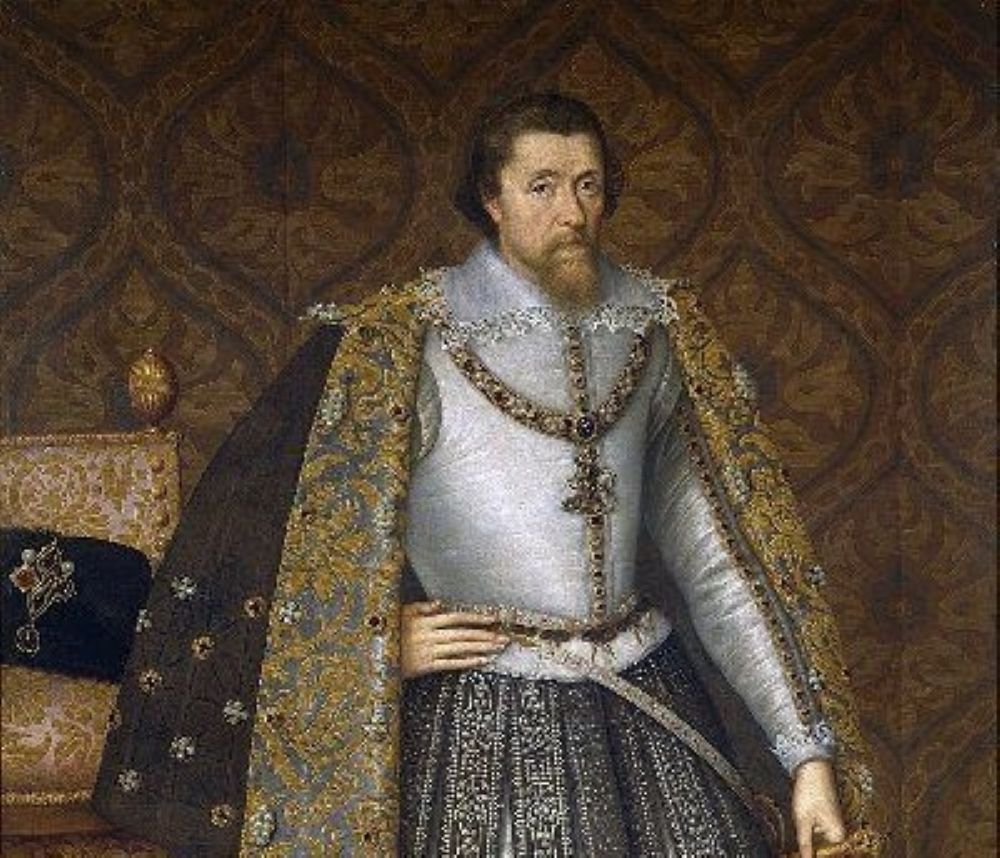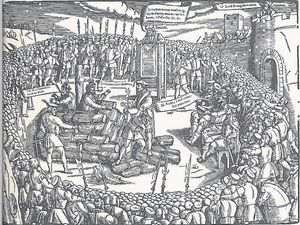If 1066 is the year every Briton remembers, 5 November is the best-known date. Whoever invented the little rhyme, ‘Remember, remember the fifth of November, gunpowder, treason and plot’, can rest easy. It seems highly unlikely that the day will ever be forgotten, even if few of us could give the year (it was 1605).
British history is littered with plots against monarchs and national figures, but the Gunpowder Plot (or ‘the Powder Treason’ as it was known) was one of the most audacious.
As the King, members of the royal family, peers of the realm and members of the council gathered for the State opening of Parliament, the plan was to destroy the building and everyone in it — removing the entire leadership of the nation in one blow.
As we all know, the conspiracy was discovered and a crisis avoided. Guy Fawkes and his fellow conspirators were rounded up and dealt with. But what if the plot had succeeded? And what actually happened? These and other questions have fuelled historical debate ever since.
Background
When James I came to the throne in 1603, English Catholics hoped for better times ahead. The respite they had enjoyed under Mary Tudor’s troubled reign was a distant memory, and the long years under Elizabeth I had become increasingly difficult for them.
In 1570 the pope had excommunicated Elizabeth and English Catholics were no longer under any obligation to show loyalty to their sovereign. Although designed to punish Elizabeth, the pope’s action actually brought greater hardship for her Catholic subjects.
Overnight they became potential traitors and the Government had no trouble justifying harsh treatment for people already ostracised by Tudor society.
Their fortunes deteriorated further following the failed invasion of England by Catholic Spain in 1588. The Spanish Armada was wrecked and Elizabethan England united under its sovereign against the common enemy — the papist religion.
But the prospect of a Stuart king brought new optimism. James had hinted that his would be a more tolerant regime. His wife, Anne of Denmark, had converted to Catholicism in her 20s and despite a Protestant upbringing James was still the son of his famously Catholic mother — Mary Queen of Scots.
Catholics were appointed to key positions and the fines imposed on Catholics who refused to attend Anglican services were waived.

Hope deferred
Having raised Catholic hopes, however, James then dashed them. In the slightly more relaxed political climate, many covert Catholics felt it safe to come out in the open. This created anxiety within the nation.
Then shortly after taking the throne, James faced two Catholic plots against him. He maintained friendships with individual Catholics but turned his face against Catholicism. He spoke in strident language against Jesuit priests in particular, and re-imposed the fines that had been waived.
Ordinary Catholics felt let down. James was no friend after all and any let-up in the persecution looked remote. For the first time in living memory the succession was settled. James and Anne had a growing family of children and a Stuart dynasty, committed to Protestantism, looked safe for many years to come.
The conspirators
These, then, were the seeds of discontent that had been sown among English Catholics. Yet there was nothing inevitable about the Gunpowder Plot. Despite underlying causes, the real responsibility for what happened in 1605 lies mostly at the door of one particular person — Robert Catesby.
Guy Fawkes may have shouldered the blame over the centuries, partly because he was at the sharp end of the operation and the first to be captured, but Catesby was the leader and the inspiration behind the conspiracy. Without him it would not have happened.
Catesby came from a well-to-do Midlands family and married a wealthy Protestant girl in his youth. In 1598 both his young wife and his father died. It was a turning point in his life. He went to live with his widowed mother and threw himself with vigour into the Catholicism in which he had been raised.
Exuding personal magnetism and charm, Catesby set about recruiting a small band of conspirators. This was not difficult. He had a network of family connections and those he enlisted were like himself — young, idealistic and pious. They were bound together in a common cause of loyalty, both to their religion and to Catesby himself.
Guy Fawkes
Guy Fawkes was the odd man out. The others were all related whereas Fawkes was an outsider. A mercenary soldier, he had served the Catholic cause by fighting for Spain in the Low Countries.
Early seventeenth-century London was a warren of homes and commercial ventures where people knew one another. A face unfamiliar in the capital was essential to the successful outcome of the plot. As a Yorkshireman returning from a long period overseas, Fawkes was ideal.
As the hostility between Spain and England gave way to more cordial relations, any hope that Spain might invade in order to install a Catholic monarch were doomed. Catesby considered the situation desperate. And since no one else seemed willing to act, he felt it was down to him and his friends.
The plot
Catesby took lodgings across the river from Westminster in Lambeth, from where the gunpowder could easily be slipped across by boat. Fawkes took the alias of John Johnson and passed himself off as the servant of Thomas Percy, another of the conspirators. Meanwhile a lease was taken out on a cellar directly beneath the House of Lords.
The circle of conspirators widened in the run-up to the fateful day, ultimately becoming a band of thirteen. To achieve a successful getaway, more men were needed — particularly in the Midlands. At the same time, with every additional member, the risk of the plot being leaked increased.
Given that some members of the House of Lords had strong Catholic sympathies, with family and friendship ties with the conspirators, it was inevitable that someone, somewhere would drop a hint — that it would be wise to find an excuse to miss Parliament’s opening on 5 November.
Discovery
So it was that the plot was leaked to a Lord Monteagle. He received an anonymous letter warning him to avoid Parliament on the fateful day. He took it to Robert Cecil, the King’s leading Minister, and Fawkes was subsequently captured red-handed.
A great deal of uncertainty exists about this letter and it is quite possible that Monteagle had already been tipped off by word of mouth. He was out of favour with the King and being the one to uncover the plot would guarantee an immediate avenue back into it — as indeed it did. So he may have drafted the letter to himself.
In any event it was the end for Catesby, Fawkes and the other conspirators. Fawkes held out under torture for an impressively long time, but it was to no avail. Some of the conspirators died in a shoot-out at Holbeach House, near Kingswinford in Staffordshire. Others faced trial for treason in Westminster Hall. The outcome was inevitable: the pronouncement of guilty, and death by being hanged, drawn and quartered.
Aftermath
Contrary to the conspirators’ expectations, ordinary Catholics were appalled when details of the plot emerged. Few would have rallied to a cause born in such violence and bloodshed. But it made little difference. As most Catholics knew at the time, the predictable backlash was severe.
The Government was able to harness the events to its own purposes. It served them well to foment public fears of conniving Jesuit priests behind the plot, even if the evidence for it was scanty.
Coming to the present time, many people today feel they are living under the threat of terror. If the Gunpowder Plot teaches us anything (along with a thousand other outrages, actual or potential, faced by our forefathers) it is that nothing has changed. Man has always lived in a hostile world.
What is the answer? Addressing the sovereign God, Isaiah says, ‘You will keep him in perfect peace whose mind is stayed on you because he trusts in you’ (Isaiah 26:3). The Lord Jesus Christ tells us not to worry — neither about food or clothing, nor over the threats and uncertainties of this life.
We are not to fret about anything bound up in the unknown day we call ‘tomorrow’. Instead, we are to seek the kingdom of God and his righteousness, knowing that if we do he will order our days in mercy and grace.




















